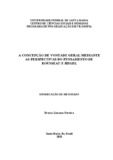| dc.creator | Pereira, Bruno Limana | |
| dc.date.accessioned | 2011-05-18 | |
| dc.date.available | 2011-05-18 | |
| dc.date.issued | 2010-09-27 | |
| dc.identifier.citation | PEREIRA, Bruno Limana. The Conception of General Will in according to the perspective of Rousseau and Hegel s Thought. 2010. 87 f. Dissertação (Mestrado em Filosofia) - Universidade Federal de Santa Maria, Santa Maria, 2010. | por |
| dc.identifier.uri | http://repositorio.ufsm.br/handle/1/9093 | |
| dc.description.abstract | The troubles that Hegel s philosophy imposed for the grasp of politic brought a restatement which combine elements that transcend the sheer assessing of being only a theory grounded in liberals doctrines, aggregating a shape of search to intermediate the aspect of juridical abstract
law, that is, one that in which the citizens get into like bears of right in the private field, reaching on the acknowledge of subject like moral agent, to be able achieve the deed through particular circumstances not covered by juridical law and, lastly, sketching the structure of social and public institutions faced the components of society that culminated in the state. It s
in this walk down to up, that is since the abstraction of private right until the necessary superstructure
of the state that we attempt to search into a concept subjacent at the circuit of the institutions mainly political, a key-concept that was inherited of Rousseau: is the concept of the General Will. This way a revision upon the premises of the Social Contract must have a
right to due confrontation with Hegel s view that take on other perspective and adopt a different reading in comparison to his French antecessor. The formulation of topic, therefore, will be in this research revisited and reflected with an eye to grasp the difference in both the
philosophers which will implicate the retaking of notions such as freedom, contract, liberalism and, of course, the own concept of state, leading us at conclusion that want to
enlighten the meaning of the expressions inside the context of the Philosophy of Right, seemingless obscure and few deepened. | eng |
| dc.format | application/pdf | por |
| dc.language | por | por |
| dc.publisher | Universidade Federal de Santa Maria | por |
| dc.rights | Acesso Aberto | por |
| dc.subject | Contrato | por |
| dc.subject | Vontade geral | por |
| dc.subject | Liberdade | por |
| dc.subject | Democracia | por |
| dc.subject | Contract | eng |
| dc.subject | General will | eng |
| dc.subject | Freedom | eng |
| dc.subject | Democracy | eng |
| dc.title | A Concepção de Vontade Geral mediante as perspectivas do pensamento de Rousseau e Hegel | por |
| dc.title.alternative | The Conception of General Will in according to the perspective of Rousseau and Hegel s Thought | eng |
| dc.type | Dissertação | por |
| dc.description.resumo | Os problemas que a filosofia de Hegel impuseram para a compreensão da política trouxeram uma reformulação que acaba combinando elementos que transcendem a mera taxação de ser simplesmente uma teoria respaldada em elementos liberais, agregando uma forma de buscar
mediar o aspecto da lei abstrata jurídica, ou seja, aquilo do qual os cidadãos passam como portadores de direitos do âmbito privado, tocando no reconhecimento do sujeito como agente moral, suscetível de realizar a ação dentro de circunstâncias particulares não abrangida pela lei jurídica e, finalmente, traçando a estrutura das instituições sociais e públicas frente aos componentes da sociedade que culmina no Estado. É neste caminhar debaixo para cima, quer
dizer desde a abstração do direito privado até atingir a super-estrutura necessária do Estado que procuraremos reavaliar um conceito subjacente ao âmbito da instituição essencialmente
política, um conceito chave que foi herdade de Rousseau: é a noção de vontade geral. Para tanto uma revisão das premissas do Contrato Social devem fazer jus para uma devida
confrontação com a visão de Hegel que assume outra perspectiva e adota uma leitura diversa da de seu antecessor francês. A formulação do problema, portanto, será nesta pesquisa revisada e refletida procurando apreender a diferença nos dois autores o que implicará a retomada de noções tais como liberdade, contrato, liberalismo e, essencialmente da figura do Estado nos conduzindo a uma conclusão que procura cavoucar o significado da expressão no
contexto da Filosofia do Direito, aparentemente obscura e pouco aprofundada. | por |
| dc.contributor.advisor1 | Klotz, Hans Christian | |
| dc.contributor.advisor1Lattes | http://lattes.cnpq.br/9583503676638320 | por |
| dc.contributor.referee1 | Rossatto, Noeli Dutra | |
| dc.contributor.referee1Lattes | http://lattes.cnpq.br/2947312243186882 | por |
| dc.contributor.referee2 | Napoli, Ricardo Bins Di | |
| dc.contributor.referee2Lattes | http://lattes.cnpq.br/0018710144049443 | por |
| dc.contributor.referee3 | Hamm, Christian Viktor | |
| dc.contributor.referee3Lattes | http://lattes.cnpq.br/5301026925485532 | por |
| dc.creator.Lattes | http://lattes.cnpq.br/0834779159150421 | por |
| dc.publisher.country | BR | por |
| dc.publisher.department | Filosofia | por |
| dc.publisher.initials | UFSM | por |
| dc.publisher.program | Programa de Pós-Graduação em Filosofia | por |
| dc.subject.cnpq | CNPQ::CIENCIAS HUMANAS::FILOSOFIA | por |


